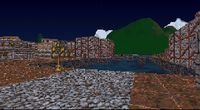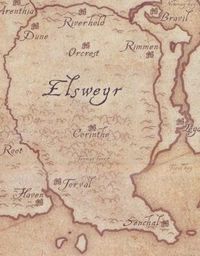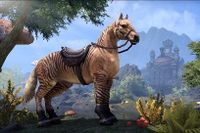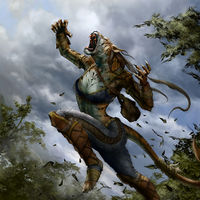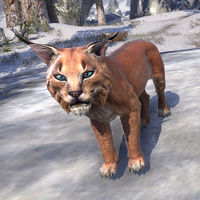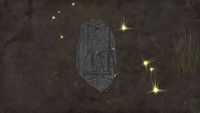Lore:Corinthe
| Corinthe | |
|---|---|
| Type | Settlement |
| Continent | Tamriel |
| Province | Elsweyr |
| Region | Pellitine (Tenmar Forest) |
| Demonym(s) | Corinthean[1] |
| Appears in | Arena |
|
Corinthe (alternatively known as Corinth)[2][3] is one of the eight major cities in the province of Elsweyr,[4] located in the very heart of the province.[2] Back in ancient times, Corinthe was the seat of power for one of sixteen kingdoms that dominated ancient Elsweyr, each of them mastered a specific discipline. The Khajiit of Corinthe were master carpenters and lumberers.[5]
Contents
Layout and Geography[edit]
Corinthe is located in the very heart of the province, specifically on the northern edge of the Tenmar Forest,[6] in its wooden highlands.[5] It is also located near savannah country, where creatures such as the Desert Lynx and pastoral Khajiiti tribes can be found.[7] Corinthe is neighbored by several settlements, including Heimthor Mount to the west-northwest, Helkarn Land to the north, and Portneu View to the southwest.[4]
Notable Locales[edit]
|
History[edit]
Long before recorded history was established, modern-day Elsweyr was split into sixteen ancestral clans that spanned across the province and eventually elevated into the status of kingdoms. Corinthe was one of the ancient kingdoms and it was known for its carpenters and builders.[5] In 1E 463, the Grand Archive in Corinthe was burned to the ground by a group of Merrunz worshippers, which destroyed most of the irreplaceable, ancient text from the Merethic Era. All that was left was painstakingly preserved by Darloc Brae, the Golden Beast of Anequina, who placed them in smaller archives and vaults throughout the province.[9]
Like the other ancient kingdoms, Corinthe was dismantled in the wake of the Thrassian Plague in the late First Era.[11] The southern Khajiiti clans were in shambles, but were guided to re-construction by the Khajiit of Senchal, who had adapted to Breton and Imperial customs. With even further help from the clan of moon-priests, the Pa'alatiin, the south took to this new way of life and in turn, created a schism of ideologies with the north.[12] Corinthe and other kingdoms in the south came together as the modern-day Kingdom of Pellitine.[11] Years later in 2E 565,[13] Elsweyr was caught in the Knahaten Flu, but slowly and surely, they overcame it. It was the Clan Mother of Corinthe, Mizaba-ko, who first identified how the flu spread from person to person.[14]
During the Imperial Simulacrum in the late Third Era, the city-state of Corinth was an active settlement. It was ruled by King Ak'nir and had a rivalry with Torval.[2] In that same time, news of the Eternal Champion's quest for the Halls of Colossus reached Corinthe and the local Mages Guild's loremaster, Turamane ap' Kolthis. The champion met with Kolthis, who promised to help them if they could retrieve a tablet stolen by Sir Galandir, and his order of warrior-priests held out in the Temple of Agamanus. After the champion recovered the tablet, Kolthis used it to decipher an Elder Scroll and uncover the location of the Halls of Colossus.[15]
Known Rulers[edit]
The Carpenter Queen of Corinthe
The lumber cats of the upland woods
The carvers and joiners of Corinthe
—Excerpt from "The Sixteen Kingdoms"
In the traditional Khajiiti child's chant, The Sixteen Kingdoms, Corinthe's ruler is referred to as the Carpenter Queen of Corinthe.[5] By the Third Era, Corinthe was ruled by a King/Queen.[2]
- The Second Era
- The Third Era
Culture and Society[edit]
The Khajiit of Corinthe believe that the Dark Moons Lynx is a worldly incarnation of Southpaw, the legendary mount of the Khajiiti god of thieves, Rajhin the Footpad.[16] This breed of lynx gets its name from its dark fur, which drew comparisons to the Dark Moons, a phenomenon that appears in a dark eclipse. The First Corinthe Hussars is a calvary of warriors from the eponymous city and the horse of their choice was the Pellitine Mustang, a breed from the small equines of Pellitine with striped patterns for camouflage under the canopy, and the larger Anequine Mustang.[17] The Kagouti can be found in the Corinthe region and the people roast it with apples and millet.[1]
Ever since the Eternal Champion defeated Jagar Tharn and ended the Imperial Simulacrum, Imperial loyalists partook in a pilgrimage all over Tamriel and re-traced the champion's steps throughout their quest.[18] Their first stop in Elsweyr would be Corinthe before they travel to the Temple of Agamanus and eventually the Halls of Colossus. By 3E 432, the Gold-Cat, Ya'Tirrje managed a large-scale skooma operation that spanned Elsweyr's cities, such as Corinthe, while he resided in luxury in Senchal.[19] Circa 4E 188, Corinthe was home to one of the three remaining Dark Brotherhood sanctuaries left on Tamriel. When the Black Hand ordered it closed the same year, the members of the chapter integrated themselves into the Cheydinhal Sanctuary.[8]
Gallery[edit]
-
Corinthe Brawler (Legends)
Notes[edit]
- Arena was originally conceived as a fighting game featuring a tournament that took the player to each of Tamriel's cities to challenge different gladiatorial teams. According to a file from that stage of development left behind in the final game, Corinthe's gladiatorial team would have been called "the Brood".[UOL 1]
See Also[edit]
- For game-specific information, see the Arena article.
References[edit]
- ^ a b Corinthean Roast Kagouti in ESO
- ^ a b c d e f Corinth location and rumors in Arena
- ^ The Black Arts On Trial — Hannibal Traven, Archmagister of the Mages Guild
- ^ a b Map of Elsweyr – The Elder Scrolls: Arena
- ^ a b c d The Sixteen Kingdoms
- ^ Map of Elsweyr – The Elder Scrolls Anthology
- ^ Desert Lynx pet description in ESO
- ^ a b Cicero's Journal - Volume 2 — Cicero
- ^ a b Origins of the Khajiiti Martial Tradition — Tendwuayne, Sapiarch of Foreign Customs
- ^ Embroidered Silken Baandari Pillow contraband text in ESO
- ^ a b Anequina and Pellitine: An Introduction — Sulema, Initiate Scholar of the Pa'alatiin
- ^ History of Pellitine: An Overview — Sulema, Initiate Scholar of the Pa'alatiin
- ^ a b History of Senchal: An Overview — Sulema, Initiate Scholar of the Pa'alatiin
- ^ a b The Eagle and the Cat — Lord Gharesh-ri, Speaker for the Mane
- ^ Halls of Colossus story quest in Arena
- ^ Dark Moons Lynx pet description in ESO
- ^ Pellitine Mustang mount description in ESO
- ^ A Minor Maze
- ^ Pocket Guide to the Empire, 3rd Edition: Sugar and Blood: the Cats of the South — Imperial Geographical Society, 3E 432
Note: The following references are considered to be unofficial sources. They are included to round off this article and may not be authoritative or conclusive.
